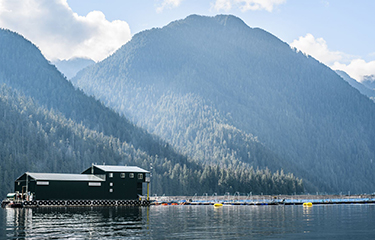The BC Salmon Farmers Association said it has “grave concerns” that Canadian Minister of Fisheries and Oceans Joyce Murray is committed to completely closing all salmon farming in British Columbia, Canada.
The organization, which represents salmon farmers in the province, said it learned Murray is proposing the further removal of salmon farms in B.C. Canada's Department of Fisheries and Oceans (DFO) has already closed 40 percent of existing farms in the region since 2020, the organization said.
In December 2020, the Canadian government announced all salmon farms in the Discovery Islands would be “phased out” over just 18 months. Salmon-farming firms and local communities said they were “blindsided” by the announcement, and a later court decision overturned then-Minister of Fisheries and Oceans Bernadette Jordan’s decision.
Following the court case, the DFO engaged in a new consultation process with the salmon-farming industry, before ultimately deciding to follow through with its original plan to end salmon farming in the region by denying license renewals for 15 open-net pen Atlantic salmon farms.
Now, BC Salmon Farmers Association Executive Director Brian Kingzett is calling out the DFO for what it calls a “flawed” engagement process that has disregarded the socio-economic impacts of closing salmon farms in B.C.
“Murray has not followed her own engagement plan, and we have constantly seen shifting deadlines and goalposts affecting the ability of participants to engage effectively, including the First Nations and salmon farming organizations,” Kingzett said. “In addition, we have had to deal with constantly changing processes, deliverables, and extremely challenging deadlines. How do you achieve success when the DFO minister keeps changing the rules and timelines?”
The association has long held that the salmon farm closures are not based on sound science, and that the DFO’s stated goal that the industry shift to land-based production isn’t feasible for remote areas that have become dependent on the industry's existing footprint. A report released in early 2023, commissioned by the British Columbia Ministry of Agriculture and Food and performed by Counterpoint Consulting, determined transitioning from net-pen aquaculture to land-based systems wouldn’t work.
“This decision is not based on any credible science, including DFO’s own peer-reviewed studies, and is not supported by the many First Nations who want to continue salmon farming in their waters,” Kingzett said. “The closure of salmon farming will decrease Canada’s local food supply, forcing Canada to import salmon from other countries to meet the needs of Canadian consumers at a significant price increase. The plan will also take away the ability of BC’s rural, coastal communities to participate in Canada’s blue economy.”
First Nations groups in the region, which formed the Coalition of First Nations for Finfish Stewardship, have supported applications for judicial review of DFO’s decision on the Discovery Islands, and Indigenous chiefs representing a number of communities have said they “can’t trust” Murray after her decisions.
Salmon farming companies in the region have also openly criticized Murray on her push to close salmon farming, especially her decision to deny license renewals in the Discovery Islands. Cermaq Canada announced it was “disappointed that once again we must turn to the courts” on Murray’s Discovery Islands decision, and supported the First Nations’ push for judicial review.
“Our industry’s future appears increasingly dictated by out of touch Ottawa political priorities and this should be a cause for grave concern for all Canadians in terms of economic stability, food security and true climate change action,” Cermaq Canada said.
The company added that the Discovery Islands decision is already impacting its future investment in B.C., regardless of whether the DFO ends up decided to close more farms.
“The lack of sincere process behind this latest decision brings all investment in Canada’s farming and resource sector into question,” the company said. “The decision recognized that many factors are contributing to the decline of wild salmon; yet chose to single out an industry, knowing full well the collateral damage it would cause to the communities, companies and the families that depend on it.”
Photo courtesy of Cermaq Canada







